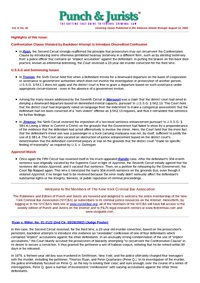In this case, the Second Circuit reversed, for the third time, a 23-year old murder conviction, based on the prosecution’s persistent, backdoor attempts to introduce into evidence an “unreliable” confession of one of four defendants which contained “implicit” accusations against the other defendants. In an unusually strong condemnation of …
In this case, the defendant was indicted for violating 21 U.S.C. §§ 841(a)(1), 846, and 18 U.S.C.S. § 2. He moved to suppress unwarned statements made to drug enforcement agents while in their custody and evidence the words led to. In a decision reported at 156 F.Supp.2d 60 (D.Me. …
Travis Randle is going to spend a long, long time in prison wondering how the U.S. system of justice works. In 1996, he and eight co-defendants were tried for and convicted of various federal offenses related to their participation in a drug trafficking conspiracy in Richmond, TX. Randle was …
Here, although the Court agreed that the district court had committed error in ordering the empanelling of an anonymous jury, it held the error was harmless in view of the extensive voir dire of the jurors and the overwhelming guilt of the defendants.
In this case, on the …
The Court held that the exclusionary rule does not bar the use of evidence seized in violation of a defendant's 4th Amendment rights at sentencing; but left open the question whether such evidence may be used when the evidence is used intentionally.
In this case, the district court …
In this case the Court held that admission of evidence of nine "bad acts" (involving prior drug transactions) under Federal Rule of Evidence 404(b) was proper to prove knowledge of possession and intent to distribute crack cocaine.
Here the Court held that admission of evidence of nine "bad …
This is an important Guidelines’ decision that will probably ignite an immediate debate about the scope of U.S.S.G. § 5K1.1 - and set off a flurry of a whole range of new departure motions. In addition, if it is not reversed by an en banc ruling, it will probably …
Here the Court rejected the defendant's contention that the failure of his indictment to allege all the essential elements of his crime constituted a jurisdictional defect under Apprendi requiring dismissal of his indictment.
The defendant appealed his conviction and sentence by the United States District Court for the …
Here the Court held that state parole boards may not deny parole to prisoners solely on the grounds that they were former drug addicts because the Americans With Disabilities Act (42 USC § 12101 et seq.) prohibits such discrimination.
This case is noted for its somewhat surprising (but …
The Court held that evidence that defendant had possessed unrelated firearm and unrelated ammunition two years earlier was not relevant under Rule 404(b) to whether he he knowingly possessed different firearm on later date in furtherance of a drug crime.
The defendant in this case was indicted for, …
Here the Court held that even though the defendant's 22-year sentence violated the Apprendi rule, the error did not affect the defendant's substantial rights nor seriously affect the fairness, integrity or public reputation of the judicial proceedings.
Appellant was a criminal defendant convicted in the United States District …
In a conviction for illegal presence in the U.S., an upward sentence departure under U.S.S.G. § 4A1.3 was proper, based on past "lenient" treatment of defendant's criminal conduct including three DWI convictions with very light sentences.
In a conviction for illegal presence in the U.S., an upward sentence …
Here the Court vacated enhancements both for using a minor to commit a crime (USSG § 3B1.4) and for obstruction of justice based on perjury at trial (USSG § 3C1.1) - holding in both cases the Government had failed to present sufficient evidence.
The defendant in this case, …
The issue before the court on this appeal was whether the State's alleged failure to disclose an understanding or informal agreement of leniency in exchange for the key witness's testimony violated Brady v. Maryland, 373 U.S. 83 (1963). Ultimately, the Court concluded that, because the petitioner, Ernest Collier, had …
The Government appealed from an order of Judge Burrage of the N.D.Okla. In which he granted an eight-level departure at sentencing, pursuant to U.S.S.G. § 2G2.4(a), asserting the departure was an abuse of discretion. The defendant pled guilty to possession of child pornography in violation of 18 U.S.C.S. § …
Here the Court held the district court erred in holding the defendant was ineligible for a § 5K2.13 departure (diminished mental capacity) because its assessment improperly relied on the indictment's language to determine his crime was a violent offense.
This is yet another case that addresses some of …
Here the Court denied a defense motion to exclude expert testimony relating to footware impression testimony, holding that it met the standards of reliability called for by Daubert and that it was relevant to the issues before the court.
The defendant in this case was charged in a …
Here the Court affirmed the denial of a writ of habeas corpus, holding that the defendant’s plea agreement was knowingly and voluntarily made despite fact that he had an IQ of 66 and was deemed to be mentally retarded.
The petitioner in this case appealed from an order …
